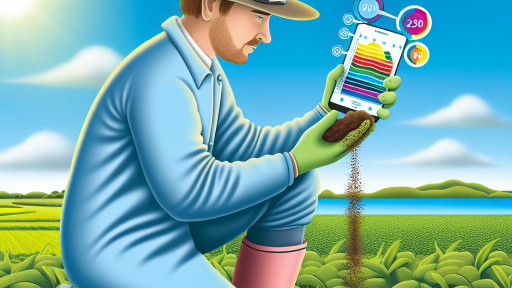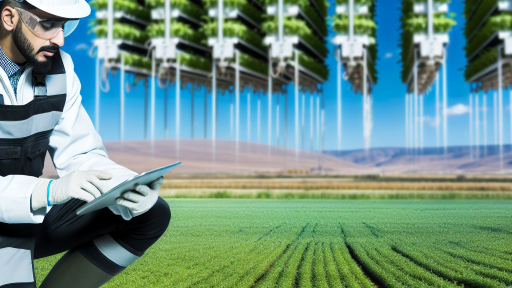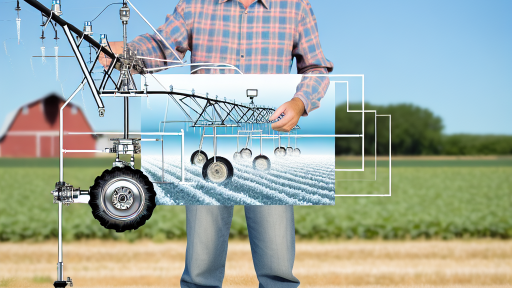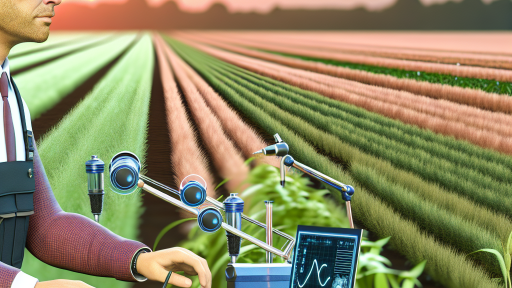Introduction to Smart Irrigation Systems and Their Importance in Agriculture
Smart irrigation systems revolutionize agricultural practices.
They enable precise water management in farming.
Consequently, farmers use resources more efficiently.
Moreover, these systems adapt to environmental needs.
Smart irrigation helps in optimizing crop yields.
Benefits of Smart Irrigation Systems
Smart irrigation systems provide numerous advantages.
First, they minimize water waste significantly.
Farmers can monitor soil moisture levels accurately.
This feature ensures optimal irrigation timing.
Additionally, smart systems reduce labor costs.
They often incorporate automation to streamline processes.
Technology Behind Smart Irrigation
Various technologies drive smart irrigation systems.
Sensor technology plays a crucial role.
These sensors collect real-time data on moisture levels.
Moreover, weather forecasts enhance irrigation scheduling.
Transform Your Agribusiness
Unlock your farm's potential with expert advice tailored to your needs. Get actionable steps that drive real results.
Get StartedData analytics help farmers make informed decisions.
Environmental Impact
Utilizing smart irrigation systems positively affects the environment.
They decrease the demand for water resources.
Furthermore, reduced runoff lessens soil erosion risks.
This approach encourages sustainable agriculture practices.
Adoption Challenges
Despite their benefits, smart irrigation systems face challenges.
Initial setup costs can be a barrier for many farmers.
Moreover, the need for technical skills complicates adoption.
Education and training programs can assist in overcoming these hurdles.
Benefits of Optimizing Water Use in Agriculture
Enhancing Crop Yields
Smart irrigation systems significantly increase crop yields.
They provide precise water delivery to plants.
This precision fosters healthier growth and productivity.
Moreover, optimized watering schedules improve crop quality.
Conserving Water Resources
Efficient irrigation systems minimize water wastage.
This conservation is crucial in water-scarce regions.
Farmers can utilize their water resources more effectively.
Consequently, this practice ensures sustainable farming.
Reducing Operational Costs
Smart irrigation technologies can lower operational costs.
They reduce energy consumption compared to traditional systems.
Through automation, labor costs also decrease significantly.
Ultimately, these savings boost overall farm profitability.
Mitigating Environmental Impact
Efficient use of water positively impacts the environment.
It helps in minimizing runoff that carries pollutants.
Additionally, optimized irrigation supports sustainable water cycles.
Showcase Your Farming Business
Publish your professional farming services profile on our blog for a one-time fee of $200 and reach a dedicated audience of farmers and agribusiness owners.
Publish Your ProfileThus, it protects local ecosystems and habitats.
Improving Climate Resilience
Smart irrigation systems enhance farms’ resilience to climate change.
They adapt irrigation volumes based on current weather conditions.
This adaptability helps mitigate drought effects.
Consequently, farmers experience greater stability in yields.
Overview of Different Types of Smart Irrigation Technologies
What is Smart Irrigation?
Smart irrigation optimizes water usage in agriculture and landscaping.
It utilizes technology to automate and enhance the irrigation process.
Furthermore, these systems ensure water conservation and efficiency.
Soil Moisture Sensors
Soyl moisture sensors gauge the moisture content in the soil.
They provide data that allows for precise watering schedules.
Through this method, plants receive the right amount of water.
Consequently, this reduces waste and promotes healthier growth.
Weather-Based Irrigation Controllers
Weather-based irrigation controllers adjust watering schedules automatically.
They rely on weather forecasts and local climatic conditions.
This technology accounts for rainfall and temperature changes.
As a result, it prevents overwatering during wet periods.
Drip Irrigation Systems
Drip irrigation delivers water directly to the plant’s roots.
This method ensures minimal evaporation and runoff.
It promotes water efficiency and reduces weed growth.
Additionally, it can be integrated with other smart technologies.
Pressure Regulators
Pressure regulators maintain consistent water pressure in irrigation systems.
This feature enhances the system’s efficiency and lifespan.
Moreover, it ensures even distribution of water across all areas.
Remote Monitoring and Control Systems
Remote monitoring systems allow users to control irrigation from anywhere.
They enable real-time tracking and adjustments via smartphones.
This feature enhances flexibility and responsiveness in irrigation management.
Integration with Data Analytics
Data analytics helps in assessing irrigation performance over time.
It provides insights into water usage trends and plant health.
This analysis allows for further optimization of irrigation strategies.
Benefits of Smart Irrigation
Smart irrigation systems lead to significant water savings.
They also contribute to healthier plants and improved yields.
Moreover, these systems support sustainable agricultural practices.
They play a crucial role in conserving water resources.
Uncover the Details: Precision Farming Techniques Using Data
Key Components of a Smart Irrigation System
Soil Moisture Sensors
Soil moisture sensors detect the water content in the soil.
These devices help determine when irrigation is necessary.
They prevent overwatering and conserve water efficiently.
Weather Stations
Weather stations monitor local climatic conditions.
They provide real-time data on rainfall, temperature, and humidity.
This information helps adjust irrigation schedules accordingly.
Showcase Your Farming Business
Publish your professional farming services profile on our blog for a one-time fee of $200 and reach a dedicated audience of farmers and agribusiness owners.
Publish Your ProfileIrrigation Controllers
Irrigation controllers automate the watering process.
They use data from soil moisture sensors and weather stations.
Adjustments happen based on the moisture needs of plants.
Drip Irrigation Systems
Drip irrigation delivers water directly to plant roots.
This approach reduces evaporation and runoff significantly.
Moreover, it ensures targeted watering at specified intervals.
Data Management Software
Data management software analyzes irrigation data.
This software visualizes and optimizes water usage patterns.
Consequently, users make informed decisions for efficient irrigation.
Communication Networks
Communication networks facilitate remote monitoring.
These networks connect sensors and controllers seamlessly.
Users receive alerts and data updates via mobile devices.
See Related Content: Implementing Sensor Technology on Your Farm
How Soil Moisture Sensors Work and Their Role in Irrigation
Understanding Soil Moisture Sensors
Ssoil moisture sensors measure the water content in soil.
They operate using various technologies, including capacitive and resistive methods.
Capacitive sensors detect changes in the dielectric constant of the soil.
This method offers high accuracy and is less affected by soil salinity.
Resistive sensors measure the electrical resistance between two probes.
As the soil dries, resistance increases, allowing measurement of moisture levels.
Both methods give real-time feedback for irrigation systems.
Benefits of Soil Moisture Sensors
Ssoil moisture sensors optimize irrigation efficiency.
Farmers can reduce water waste by irrigating only when necessary.
This technology promotes healthier plants by preventing over- or under-watering.
Additionally, it helps in conserving energy used in irrigation operations.
Operating costs decrease when water use is minimized.
Smarter irrigation also supports sustainable farming practices.
The Role in Irrigation Systems
Ssoil moisture sensors play a crucial role in smart irrigation systems.
They provide data that allows automated irrigation scheduling.
Moreover, systems can adjust watering schedules based on real-time soil conditions.
This flexibility maximizes water use efficiency across diverse climates.
Integration with weather forecasts enhances irrigation decisions.
Thus, farmers can water optimally, avoiding unnecessary runoff.
Real-World Applications
Many farms are adopting soil moisture sensors for effective irrigation management.
In vineyards, these sensors help maintain optimal grape hydration.
In row crops, they ensure consistent moisture for better yields.
Furthermore, municipal parks utilize these sensors for landscape irrigation.
This approach not only conserves water but also sustains lush greenery.
Overall, soil moisture sensors are vital in modern agricultural practices.
Learn More: Implementing Robotics On Your Farm
Integration of Weather Data in Smart Irrigation for Enhanced Efficiency
Importance of Accurate Weather Forecasting
Accurate weather forecasting plays a crucial role in smart irrigation systems.
Showcase Your Farming Business
Publish your professional farming services profile on our blog for a one-time fee of $200 and reach a dedicated audience of farmers and agribusiness owners.
Publish Your ProfileIt enables farmers to schedule watering based on real-time climate conditions.
This integration helps avoid overwatering and underwatering.
Consequently, plants receive the precise amount of moisture they need.
Utilizing Local Climate Data
Local climate data enhances the effectiveness of irrigation strategies.
Farmers can access specific weather patterns in their region.
Therefore, they can adjust their irrigation schedules accordingly.
This adaptation optimizes water usage and reduces waste.
Automating Irrigation Systems
Smart irrigation systems can automate watering based on weather data.
For instance, when rain is predicted, irrigation can be paused.
This automation ensures plants receive care without manual intervention.
As a result, it saves both time and water resources for farmers.
Data-Driven Decision Making
Smart irrigation systems leverage data analytics for decision making.
Farmers receive actionable insights regarding water needs.
This data-driven approach increases efficiency across agricultural practices.
Moreover, it leads to better yield and crop quality.
Integration with IoT Technology
Integrating IoT technology enhances smart irrigation capabilities.
It connects various sensors to monitor soil moisture and weather conditions.
Farmers can manage their irrigation systems remotely.
This connectivity promotes timely adjustments and optimal water use.
Find Out More: Training Your Team For Robotic Farming
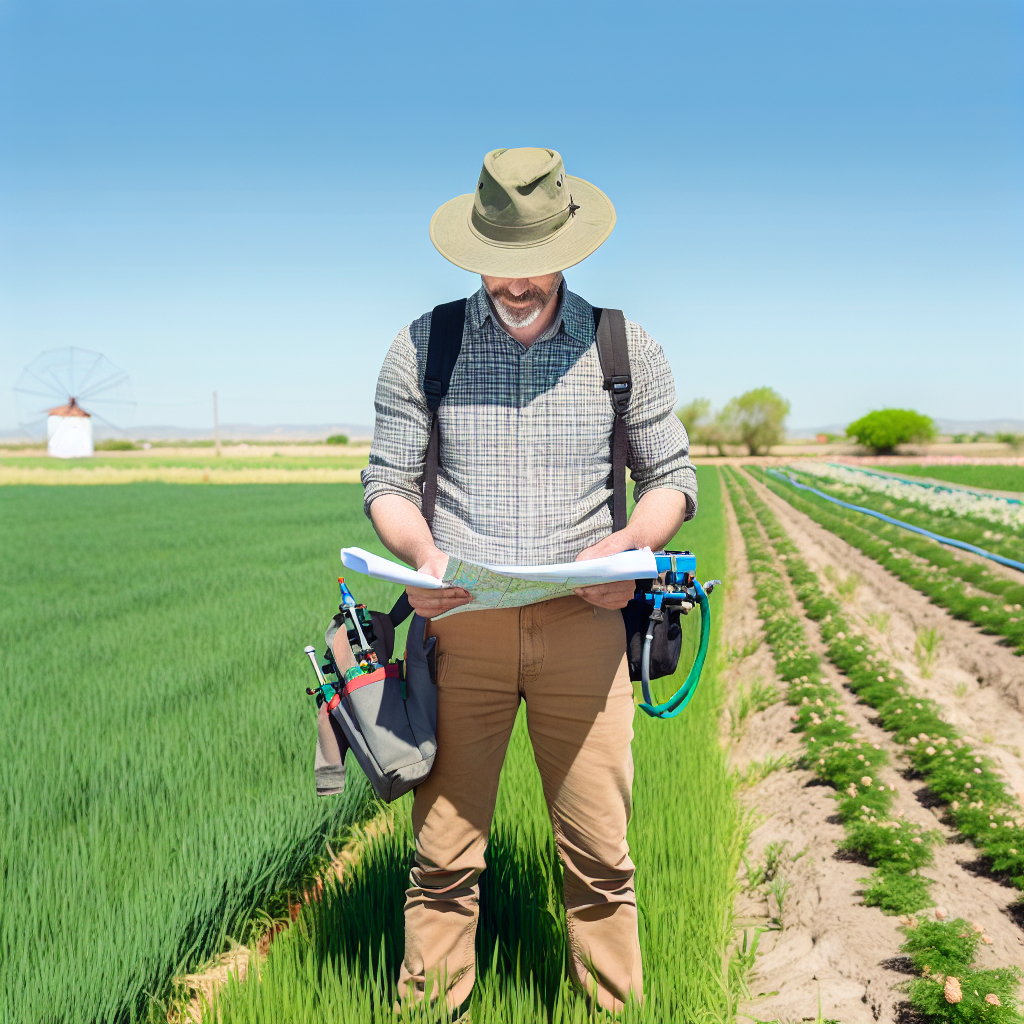
Case Studies: Successful Implementation of Smart Irrigation Systems
Innovative Approaches in California
In California, Green Valley Farms adopted smart irrigation systems in 2021.
This system uses soil moisture sensors to optimize water usage.
As a result, the farm reduced water consumption by 30% in one season.
Furthermore, crop yields increased by 15% due to better watering practices.
Transforming Agriculture in Australia
AgriculTech in Australia implemented a smart irrigation pilot program.
This program featured weather forecasting tools to schedule irrigation.
Consequently, farmers saved up to 25% on their water bills.
Additionally, these systems helped improve soil health significantly.
Community Efforts in Spain
The town of La Albufera, Spain, initiated a community irrigation project.
They introduced a centralized smart irrigation system for local farms.
This system monitored water levels and crop needs in real-time.
As a result, the community reported a 40% reduction in water waste.
Utilizing Data in Brazil
AgroSmart in Brazil utilized big data for farming efforts.
They integrated smart irrigation with advanced data analytics tools.
This allowed them to predict irrigation needs accurately.
The outcome was an impressive increase in productivity and efficiency.
Challenges and Solutions in Adopting Smart Irrigation Technologies
Understanding the Barriers
Farmers often face high upfront costs when installing smart irrigation systems.
Budget constraints limit many from adopting new technologies.
Additionally, a lack of technical knowledge can hinder successful implementation.
Moreover, unreliable internet access poses a significant challenge in rural areas.
Showcase Your Farming Business
Publish your professional farming services profile on our blog for a one-time fee of $200 and reach a dedicated audience of farmers and agribusiness owners.
Publish Your ProfileEnvironmental factors, such as varying soil types, complicate system effectiveness.
Identifying Potential Solutions
One effective solution includes offering grants to support technology adoption.
Providing training programs enhances technical skills among farmers.
Partnerships with local tech companies can improve system accessibility.
Furthermore, creating community networks fosters shared knowledge and resources.
Incorporating Innovative Approaches
Leveraging mobile applications can simplify system management for farmers.
These apps can monitor irrigation needs based on real-time weather data.
Remote access capabilities allow for adjustments from anywhere at any time.
Using sensors in the field optimizes water use and improves efficiency.
Building Long-term Sustainability
Sustainability initiatives encourage collaboration among stakeholders.
Local governments can offer incentives for those who adopt smart systems.
Developing educational campaigns raises awareness of the benefits.
Advocating for long-term investment in infrastructure can lead to better support.
Future Trends in Smart Irrigation and Water Management
Advancements in Technology
Innovations in sensor technology enhance irrigation systems’ efficiency.
These sensors can monitor soil moisture levels in real time.
Moreover, remote sensing technology offers valuable data from above.
This data aids in decision-making for optimal watering schedules.
Integration with IoT
The Internet of Things (IoT) revolutionizes smart irrigation systems.
IoT devices can communicate seamlessly with each other.
This integration allows for automated adjustments in watering practices.
As a result, farmers can conserve water and resources.
Data Analytics and Machine Learning
Data analytics play a critical role in smart irrigation’s future.
Machine learning algorithms assess historical data for predictions.
These insights drive better decision-making in water management.
For example, farmers can identify weather patterns influencing irrigation needs.
Regulatory and Environmental Considerations
Governments increasingly emphasize sustainable water use practices.
New regulations surrounding water usage will shape future technologies.
Compliance with environmental standards will drive innovation in these systems.
Consequently, companies must adapt to meet these new challenges.
Public Awareness and Adoption
Educating the public on water conservation is vital.
Increased awareness will lead to higher adoption rates of smart systems.
Community initiatives can promote sustainable irrigation practices.
As more users embrace these technologies, overall efficiency will improve.
The Impact of Smart Irrigation on Sustainable Farming Practices
Enhancing Water Efficiency
Smart irrigation systems significantly enhance water efficiency.
They utilize sensors to monitor soil moisture levels.
As a result, these systems apply water only when necessary.
Consequently, farmers can reduce water wastage effectively.
Technology plays a crucial role in optimizing water use.
Improving Crop Health
These systems contribute to improved crop health and yield.
Consistent watering promotes strong root development.
Showcase Your Farming Business
Publish your professional farming services profile on our blog for a one-time fee of $200 and reach a dedicated audience of farmers and agribusiness owners.
Publish Your ProfileMoreover, targeted irrigation minimizes the risk of plant disease.
Healthy crops lead to higher productivity and profit margins.
Reducing Environmental Impact
Smart irrigation helps reduce the environmental impact of farming.
It lowers energy consumption associated with water transport.
Additionally, it minimizes runoff and nutrient leaching.
This practice protects local water bodies from contamination.
Economic Benefits
Farmers experience numerous economic benefits from smart irrigation.
Initial investments in these systems yield significant savings over time.
Reduction in water bills directly boosts profitability.
Furthermore, increased crop quality can attract higher market prices.
Supporting Sustainable Practices
Adopting smart irrigation aligns with sustainable agricultural practices.
It demonstrates a commitment to responsible resource management.
This approach can enhance the reputation of farming operations.
Furthermore, it can make farms more resilient to climate change.
Community and Collaboration
Smart irrigation fosters community collaboration among farmers.
Sharing technologies can lead to collective benefits.
Additionally, local governments may provide incentives for adoption.
Such collaboration strengthens sustainable practices in entire regions.
Additional Resources
Model-based smart irrigation control strategy and its effect on water …
Ways to Optimize Your Water Usage – The Benefit of Smart Irrigation …

